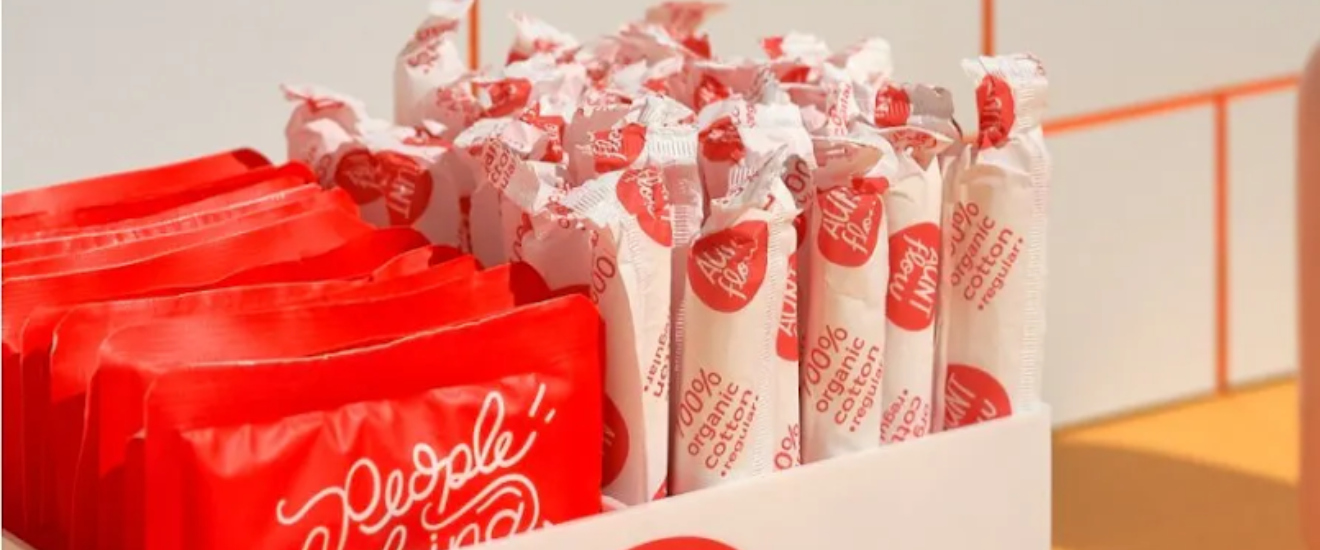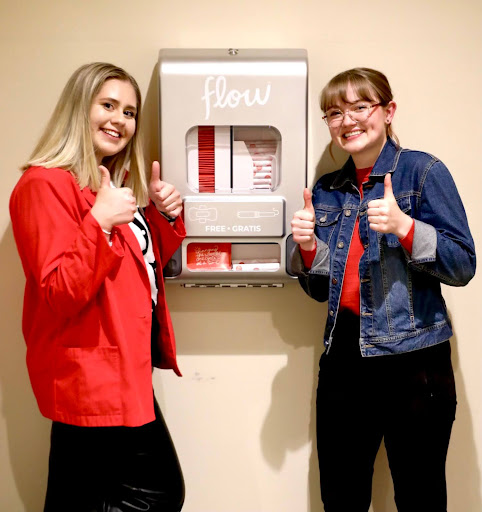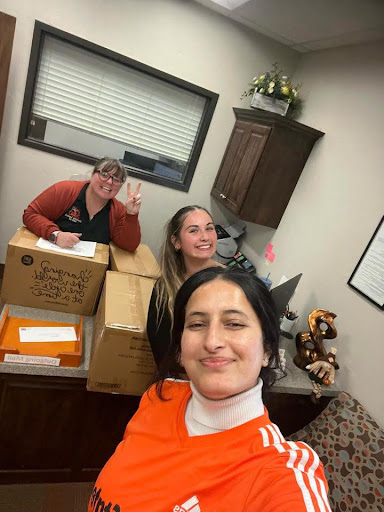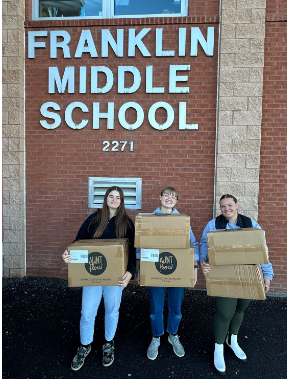People Helping People, Period.

The ASISU Period Project
By Megan Condie and Emma Watts
The ASISU Period Project
In a recent survey conducted among 6th through 12th graders in Idaho, it was found that 68% reported either experiencing or knowing someone who had experienced significant absence from class due to inadequate access to period products.1 For many people reading this article, 6th grade was years, maybe even decades, ago. However, this issue has persisted for generations, and it continues to impact all of us well into adulthood. Whether you menstruate or not, having continuous access to free menstrual products at school is vital to developing our communities. By understanding this ubiquitous issue and helping menstruators be present for their schooling, we can make great strides in improving the equity of our education system.
So what is menstrual advocacy? Two key phrases in this field are “period poverty” and “menstrual equity.” Period poverty is simply the reality that many people cannot afford or easily access necessary menstrual products, and menstrual equity is the idea that every menstruator deserves to have easy access to the resources that best serve their specific menstruation needs. These definitions become more complex as we factor in how multiple demographic indicators, including income, race, disability, chronic illness, and more, impact an individual's lived experiences. Across the US, the menstrual advocacy movement has continued to gain traction over the last decade, but there is still so much room for improvement. A great resource for understanding these improvements and opportunities is the State of the Period, a national survey created by PERIOD and Thinx. The 2023 report outlines four key areas: product access, stigma, open communication, and action (note that low-income and racial minorities are almost always more heavily impacted in each of these areas). In taking a few minutes to comb through the report, four key statistics stand out in each area:
reality that many people cannot afford or easily access necessary menstrual products, and menstrual equity is the idea that every menstruator deserves to have easy access to the resources that best serve their specific menstruation needs. These definitions become more complex as we factor in how multiple demographic indicators, including income, race, disability, chronic illness, and more, impact an individual's lived experiences. Across the US, the menstrual advocacy movement has continued to gain traction over the last decade, but there is still so much room for improvement. A great resource for understanding these improvements and opportunities is the State of the Period, a national survey created by PERIOD and Thinx. The 2023 report outlines four key areas: product access, stigma, open communication, and action (note that low-income and racial minorities are almost always more heavily impacted in each of these areas). In taking a few minutes to comb through the report, four key statistics stand out in each area:
- In 2023, roughly a quarter of teens (13-19) and a third of adults (20-50) struggled to afford period products.2
- 75% of teens and 78% of adults surveyed said that there is a negative association that periods are gross and unsanitary.2
- More than 50% of teens agree that periods are not openly discussed at school and that they don’t feel comfortable discussing them at school.2
- More than 80% of teens agree that everyone should be taught about issues with menstrual product access and menstruation in general.2
What do these statistics show when taken together? They show that this is a multi-faceted issue that requires advocacy on different fronts. Not only do schools (and other public entities) need improved access to menstrual products, there also needs to be more open conversations that help to normalize this topic and teach everyone, whether they menstruate or not, about this biological process and its social impacts. It will take time and patience, but this is a cause that is worth those efforts.
Knowledge of these issues and existing advocacy efforts are what inspired local ISU student leaders to take on a period project and make an impact in their community. It all began when a truly remarkable student, Samantha Lee, brought her concerns around the issue of menstrual advocacy to the former ASISU Vice President of Idaho Falls, Megan Condie. Megan was immediately hooked on the idea of bringing free menstrual products to ISU, and with the active support of ASISU President Emma Watts and other student government members, the beginnings of a more equitable education experience were set in motion. At the end of the 2023 academic year, ASISU used discretionary funds to purchase six Aunt Flow dispensers and thousands of refillable pads and tampons. In addition to installing these dispensers, small containers containing free pads were placed in other bathrooms across campus. With this accomplished, ASISU set out on their next project, celebrating Period Action Day by distributing a donation of 86,500 pads (yes, that is the correct amount of zeroes) across the ISU and Pocatello communities. The national nonprofit organization, PERIOD, had kindly sent this generous donation, and with a group of 24 volunteers, ASISU used it to combat period poverty in our area. Pads were placed in on-campus resources, such as the Wellness Center and Benny’s Pantry, and off-campus locations, such as local crisis centers and the Pocatello/Chubbuck School District.
make an impact in their community. It all began when a truly remarkable student, Samantha Lee, brought her concerns around the issue of menstrual advocacy to the former ASISU Vice President of Idaho Falls, Megan Condie. Megan was immediately hooked on the idea of bringing free menstrual products to ISU, and with the active support of ASISU President Emma Watts and other student government members, the beginnings of a more equitable education experience were set in motion. At the end of the 2023 academic year, ASISU used discretionary funds to purchase six Aunt Flow dispensers and thousands of refillable pads and tampons. In addition to installing these dispensers, small containers containing free pads were placed in other bathrooms across campus. With this accomplished, ASISU set out on their next project, celebrating Period Action Day by distributing a donation of 86,500 pads (yes, that is the correct amount of zeroes) across the ISU and Pocatello communities. The national nonprofit organization, PERIOD, had kindly sent this generous donation, and with a group of 24 volunteers, ASISU used it to combat period poverty in our area. Pads were placed in on-campus resources, such as the Wellness Center and Benny’s Pantry, and off-campus locations, such as local crisis centers and the Pocatello/Chubbuck School District.
While on the long trek to donate hundreds of pads to every middle school and high school in School District 25, ASISU volunteers came across so many grateful individuals – school secretaries, counselors, teachers, and other staff who work day in and day out for their students. However, at a school with higher numbers of socioeconomically disadvantaged students, one staff member’s response had a deeper impact. She showed volunteers a room filled with basic necessities for her students – everything from hair brushes to toothpaste to winter clothes – in addition to bathroom containers filled with free menstrual products. As she described the needs of these students and what this donation would mean to them, she started to tear up. This is the kind of special impact that ASISU is inspired to drive. An impact that makes tangible, meaningful differences to those in our community.
Today, ASISU is actively working with administrators to institutionalize this period project. ASISU and university administration are currently exploring cost-effective options for dispensers that can be placed in every women’s and gender neutral bathroom across the ISU campuses! This means the university, not just ASISU, will be responsible for purchasing more dispensers for campus bathrooms and for keeping those dispensers stocked far into the future. For a current list of all campus bathrooms and locations that have free products, please visit the following link: https://maps.isu.edu/?id=2108#!ce/74168?ct/76334,74197,71803,71801,71813,71814,74192,76584?s/. In addition, ASISU will continue to receive donations from PERIOD as they are able to donate menstrual supplies. This means that ASISU will continue to spread free products across all campuses and our communities!

If this project sparked a deeper interest in you, students are always encouraged to run for elected ASISU positions or apply for appointed ones – this is an incredible opportunity to make a direct impact. No matter how you choose to get involved, even if it’s simply by using the free products or telling your friends about them, your support is vital in ensuring the successful future of this work. People helping people, period.
References:
1 Idaho Period Project Survey of Idaho 6th - 12th graders
2 State of the Period 2023 | SOTP-2023.pdf (period.org)
